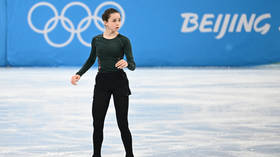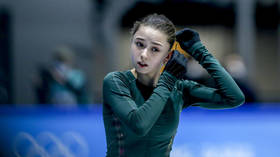
RT: Heading into the Winter Olympics, Kamila Valieva would have been forgiven for thinking that the main opposition she faced in Beijing would be from her rivals on the ice.
Utterly dominant all season, Valieva looked liked a shoo-in for the ladies’ singles title in Beijing, having wrapped up the European and Russian crowns in recent months, and after already collecting one gold medal for the Russian Olympic Committee (ROC) with a dazzling display in the team event in the Chinese capital.
But as we now know, the 15-year-old is confronted with far bigger opposition to her further success in Beijing than just her figure skating competitors.
Suffocating speculation
That was something confirmed by Friday’s announcement by the International Testing Agency (ITA) that Valieva returned a positive doping test from a sample at the Russian nationals back in December.
The news has, at least, ended some of the stifling speculation that had surrounded Valieva.
Ever since Tuesday’s announcement that the medal ceremony for the figure skating team event was postponed, murmurs had turned into an incessant drone, drowning out almost everything else going on with the ROC team in Beijing.
In some ways, it is a small mercy that we now know some of the facts.
The ITA – apparently reluctantly – named Valieva as the athlete in question in their announcement after reports in the Russian media and elsewhere that she was at the center of a “legal issue” the International Olympic Committee (IOC) was dealing with.
The ITA suggested naming Valieva outright had been forced upon them by circumstance, “seeing that some in the media did not grant her the same protection and have reported widely on the basis of unofficial information.”
It’s true: much of the media response to Valieva’s plight – and seemingly scant regard for her status as a minor – is one particularly unsavory aspect to this saga.
One could argue that at least now we have an official version of events, neatly tied up in a timeline from the ITA.
Valieva’s positive sample is from December 25, when she was tested by RUSADA on her way to winning the Russian title in St. Petersburg.
The sample was sent to a WADA-accredited in laboratory in Stockholm, Sweden, for analysis. (Russia currently does not have WADA approval for its own lab in Moscow.) There, the probe revealed traces of the prohibited substance trimetazidine – a drug used to treat angina and chest pain.
Then – and we’ll come back to this point later – the result was reported to officials in Beijing on February 8 (although Russian officials later said February 7).
The Russian Anti-Doping Agency (RUSADA) was informed, and provisionally suspended Valieva with immediate effect.
However, Valieva successfully appealed that decision with RUSADA’s independent Disciplinary Anti-Doping Committee on February 9 – freeing her to train in Beijing ahead of her planned appearance in the ladies’ figure skating singles event, starting on Tuesday.
The problem is that for Valieva to line up on the ice that day, she’ll have to navigate a whole host of legal obstacles before she can even think about landing one of her trademark quads.
The big guns of the IOC, WADA and the International Skating Union (ISU) have all aligned in their intention to appeal the decision to lift Valieva’s provisional suspension; if they get their way with the Court of Arbitration for Sport (CAS), we likely won’t be seeing Valieva again in Beijing.
Doping test delays
The legal battle lines are clearly drawn, and Valieva will be given support from the ROC, the Russian Sports Ministry, and the Russian figure skating federation – as well as from millions more in her homeland.
But while it will be left to the lawyers, on closer inspection some things already don’t seem to hold up under scrutiny.
Chief among them is the amount of time it took for the WADA lab in Sweden to report the positive test.
Why, if the sample was taken on December 25, did we only learn about Valieva’s positive result more than six weeks later – and after Valieva had already starred in the ROC team’s gold medal win?
That is one glaring discrepancy not lost on ROC chief Stanislav Pozdnyakov.
“In accordance with international standards for laboratories of the World Anti-Doping Agency, the deadline for an A Sample is 20 days from the moment the sample was received in the laboratory,” he told reporters in Beijing.
“It looks very strange that it took almost a month for the sample to get from St. Petersburg to Stockholm. This raises very serious questions for me. It seems like someone held this probe until the end of the team skaters’ competition.”
On the face of it, it’s a legitimate question which is screaming out for an answer – and one which a RUSADA statement on Friday offered only some insight to.
According to Russian anti-doping officials, their counterparts at the Swedish lab which handled Valieva’s sample were delayed due to Covid-related issues and restrictions.
OK, fair enough, but will we get confirmation that other results were delayed, or was it just Valieva’s?
Next, questions on the positive test itself.
How did trimetazidine get into Valieva’s system? Can her coaches and doctors offer insight, and are they in some way accountable, even if wholly unintentionally? (On this latter point, we should note that RUSADA is investigating this.)
Is there an alternative explanation, potentially linked to the WADA advisory note issued in 2018 that states that trimetazidine could crop up in urine samples as a false positive for lomerizine, a migraine medication which is permitted?
What about a B-Sample? How can you account for the ROC’s assertion that Valieva repeatedly passed doping tests both before and after the positive sample from December 25 – including at the Beijing Games?
From the side of CAS, they will have to judge on the reasoning for the decision by the disciplinary committee to lift Valieva’s provisional suspension and free her up to train and compete in Beijing while the row rumbles on. There must have been some reasoning behind that, which is surely of not insignificant importance?
Looking at the bigger picture, would anyone in Russia really intentionally dope one of their best Beijing gold-medal prospects – and most high-profile athletes – knowing that the eyes of the drug-testing world are upon them?
ROC athletes are among the most tested athletes at these Games, just as they were in Tokyo. Valieva is already head and shoulders above the competition, so why would she need to take something which some have quibbled shouldn’t even be on the WADA list, given any questionable benefits (not least in a sport like figure skating)?
Jumping to conclusions
Nonetheless, the firm assertion from some in the West seems to be that this was a deliberate plot by Russian doping masterminds.
The fact that American anti-doping officials at USADA have pounced so effortlessly on the situation is predictable and yet disconcerting.
There seems to be a desperate desire among them to prosecute Russians through some poetic justice under the law concocted in the name of Grigory Rodchenkov – the dodgy doctor who blew the whistle on allegations of Russian state-sponsored doping, only to flee the country. (Rodchenkov, let’s remember, remains in hiding and has been charged in absentia in his homeland for abuse of office.)
The row will be seized upon to wrap up a whole bundle of accusations against Russia: Look at the way young athletes are treated! Look at how the system chews them up and wantonly spits them out with scant regard for the consequences! Look at what years of supposed systematic cheating has created!
All in all, the scandal surrounding Valieva offers a ripe opportunity to try and squash Russia yet again, just as the nation was edging its way towards the completion of its WADA ban in December, when the Russian flag and anthem would finally return to accompany Russian athletes at major international sporting events.
The real problem, though, is that a narrative is quickly forming before we have the answers to some very big questions – not least from the people who are seeking to force Valieva out of the competition in Beijing.
In many ways, Friday’s announcement has raised many, many more questions than it has answered – and not necessarily for people in Russia.
By Liam Tyler

Vaughn Klingenberg has a Master’s Degree in Philosophy from Marquette University where he taught Logic. He lived in Europe; mostly Poland and England for two years and traveled widely throughout Europe and the Middle East (sojourning for a month in Israel). His areas of interest center on conspiracies; especially Jewish conspiracies. He considers himself a “conspiracy factualist”–not a conspiracy theorist–as well as a Holocaust Truther–not a Holocaust denier. He has self-published two books on Shake-speare under the pseudonym “Odysseus Er”: Hamlet-Christ (a Judeo-Christian interpretation of Hamlet), and Paradigm Shift: Shake-speare (an analysis of Jonson’s Introductory Poem to the 1623 Folio which reveals the 17th Ear of Oxford as the true author of the Shake-speare corpus). He has also written a booklet in his own name on the Holocaust entitled, The Big Lie: The Holocaust (An Introduction to the Greatest Fraud of the 20th Century). All his work and books can be found on his website at BooksByVk.org. – Vaughns’ VT Archives (2016-2022)
ATTENTION READERS
We See The World From All Sides and Want YOU To Be Fully InformedIn fact, intentional disinformation is a disgraceful scourge in media today. So to assuage any possible errant incorrect information posted herein, we strongly encourage you to seek corroboration from other non-VT sources before forming an educated opinion.
About VT - Policies & Disclosures - Comment Policy







Valieva’s athleticism and artistry are off the charts. Just watch her skate. The drug in question, trimetazidine, improves endurance. She doesn’t need it to win. She will win the gold, and it will be one of those asterisks in Olympic history. If you listen to former competitors in the sport, in unison, they think the decision to allow her to further compete is the wrong decision.
Americans too, and entire world too pissed off as hell about it too.
They just couldnt let it be a Russian that every every young girl in world looks up to and dreams they could be like her could they. So they release a phony drug test from Dec 25
Kamilas performance was jaw dropping beautiful.
Contrast her with American olympic figure skater Tonya Harding, who paid someone to break the knees of her ice skating rival with a steel bar.
You would need some really good drugs to think up something like that and then actually do it.
I would want to make sure it is not the host country. There have been several athletes with grievances regarding disqualifications. Its not like doping is not a thing. I would suspect the church or rogue agents before our actual government on this one. or, the girl may well have been doping. Many do it.
All professional sports in the US are compromised and should be assumed as gambling material. As for the Olympics, it has been politicized for decades, and it only gets worse.
As a general rule, countries do not present their best athletes. They present the wealthiest children with access to expensive travel and training equipment. The cost of raising an Olympic Archer for instance in the US, is not known, but it is fairly evident, that the average person cannot afford the process. The operation to “recruit” the Karolyi’s for USA gymnastics was done by joint efforts by FBI, and Catholic church personnel. This resulted in Romania receiving favored nation status. The Catholic church is more involved in sports than most people know, and recently a priest even temporarily served as “manager” for the Carolina Panthers, when they ousted the owner.
Comments are closed.